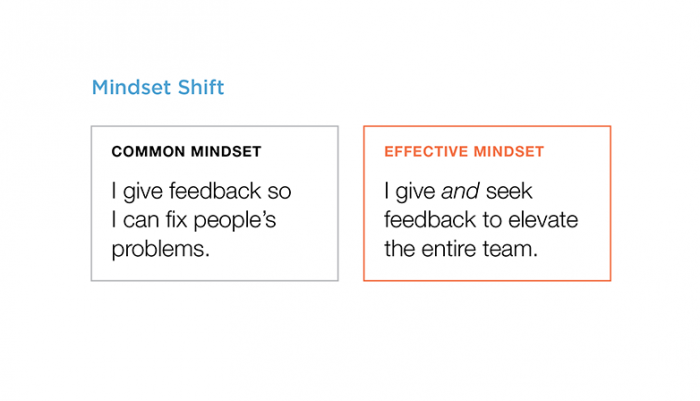Practice 4: Create a Culture of Feedback

Balance courage and consideration.
When it comes to giving feedback, there are two extremes:
- Too much courage. This type of leader has no problem telling anybody what they think. They often give too much feedback, too harshly, and too often.
- Too much consideration. For this other type of leader, the thought of giving someone tough feedback makes them want to throw up. So, they avoid it entirely, and the problems not only persist, but grow.
Both extremes of the spectrum do their teams a disservice. With too much courage and not enough consideration, self-esteem or confidence can be destroyed. But just as damaging is too much consideration and no courage, where the leader unintentionally abandons their team. By not giving feedback at all or being too vague, they’re reinforcing employees’ weaknesses. The team members keep falling into the same traps that hinder their performance and growth.
Failing to give feedback also damages the team’s perception of the leader. If they seem to be ignoring a challenging or difficult issue, the team may see weak as weak and lose confidence in their abilities.
Free Guide
Leading a team requires a different skillset than working as an individual contributor.
Register for an Event
Discover the proven best practices to develop your people into a high-performing team.
Clarify Intent
Giving feedback comes down to motives. The team must know and believe that their leader’s intent is to help them develop their skills and talents.

Effective Feedback
The ineffective leader mindset is to think of themselves as “the fixer”: their team has problems, so they think it’s their job to point out what the team is doing wrong through feedback. In contrast, the effective mindset is all about unleashing the potential in others—including the leader themselves, when they seek feedback.
People regard feedback differently based on their individual experiences, but some universal principles apply to almost everyone. Feedback matters just as much to a young employee working her first job out of college as it does to the thirty-year veteran starting to think about retirement.
As leaders master giving and receiving feedback through practice, they’ll get to a place where they can use their natural instincts to grow a culture in which constructive, well-intended thoughts flow freely in both directions. Everyone feels heard and respected, and performance and productivity blossom.

One of the greatest gifts you can give another human being is constructive feedback on a blind spot they never knew they had. It’s a great disservice not to say what needs to be said because it isn’t comfortable. Care enough to give honest, accurate feedback.
Leading a team requires a different mindset than working as an individual contributor. Explore the critical mindset shifts that will maximize success as a leader of others.
Increase engagement of team members by conducting regular 1-on-1s, deepen your understanding of team member issues, and help them solve problems for themselves.
Create clarity about team goals and results; delegate responsibility to team members while providing the right level of support.
Give feedback to develop team member confidence and competence; improve your own performance by seeking feedback from others.
Identify specific actions to help team members navigate and accelerate through change and achieve better performance.
Use weekly planning to focus on the most important priorities, and strengthen your ability to be an effective leader by applying the 5 Energy Drivers.







